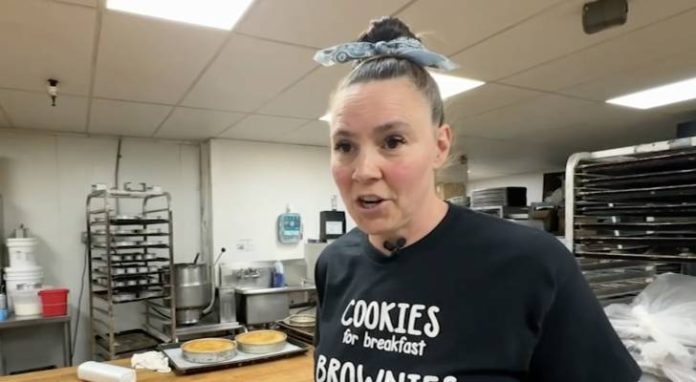Sarah Torres was counting on two government checks to keep her family-owned bakery afloat when an unfortunate mishap turned her business upside down.
After depositing two Employee Retention Credit (ERC) checks from the U.S. Treasury worth $212,853, Torres discovered that not only were the checks placed on hold, but her entire business account was frozen.
“It was just a nightmare,” Torres told ABC7 News. “I was crying to them, ‘please, this is a business account… I have 20 employees that I need to pay!’”
Torres eventually learned that the issue was a clerical error involving her business’s Employer Identification Number (EIN) that had been changed last year but apparently wasn’t updated with the IRS.
For more than a month, Torres struggled to access her business funds — which threatened the very existence of A Sweet Affair Bakery, a staple for those with a sweet tooth in Walnut Creek, California for more than four decades.
Congress created the ERC program in 2020 to help U.S. businesses keep employees on payroll during and after the COVID-19 pandemic. For Torres, these credits represented a vital financial lifeline.
“It’s money we’ve been waiting for years for, and we desperately need,” said Torres.
Unlike many small businesses during the pandemic, A Sweet Affair Bakery didn’t receive any federal Paycheck Protection Program loans, making these retention credits all the more critical to her operation. But with her business account frozen, Torres was forced to take drastic measures.
“We had to take out money from my kid’s college account… borrowed money from family members,” she said. “So it’s been a lot of stress. And I don’t really know why.”
When Torres contacted the IRS about the situation, she was reportedly told there were no flags on her account and that the agency had verified the cashed checks with her bank.
“I was so confused — like someone’s stealing our money? What’s going on?” she asked.
Her attempts to resolve the issue with Bank of America proved to be equally frustrating. Torres estimates she tried to contact the bank “hundreds” of times, with disappointing results.
“At one point, they hung up on me,” Torres said. “[The bank] told me to stop calling. I also sent several emails, but never got responses. And I mailed documents, overnighted with a signature, and never got a response.”
After finally reaching a bank representative, Torres was told her funds would be released within seven to ten business days, but that never happened. Instead, she says the bank kept delaying the date her business account would close, leaving her without access to her money and forcing her to consider shutting down her bakery or refinancing her home.
Stay in the know. Join 200,000+ readers and get the best of Moneywise sent straight to your inbox every week for free. Subscribe now.
After ABC7 News’s 7 On Your Side team stepped in to help Torres, Bank of America finally offered an explanation.
“Due to a discrepancy in tax identification numbers following a change in ownership of the business, the Treasury Department reported to us that these deposited funds might be fraudulent,” the bank said in a statement.
“Our subsequent investigation revealed additional information, and we determined there was no fraud. We are working with the Treasury Department and the client to complete the transactions.”
According to tax experts, this situation should have never escalated to this point.
“Since the bakery was using the same bank, the bank should’ve been able to identify the old EIN alongside the new EIN on that account and not treat it like it’s fraudulent,” said Chris Housch of Housch Tax Law. “And they should be able to honor that check.”
Yes, a U.S. bank can freeze a business bank account if there’s an error with the EIN.
Banks are required to verify customer information to prevent fraud and comply with regulations like Know Your Customer and Anti-Money Laundering. For businesses like LLCs, corporations and partnerships, an EIN is typically mandatory for account setup.
An EIN verification letter is often part of the bank’s due diligence, proving the business’s legitimacy and compliance with federal tax regulations. When discrepancies arise, banks may freeze accounts while investigating.
Other common reasons that lead to frozen accounts include:
-
Suspicious or unusual transactions
-
Failure to comply with Know Your Customer/Anti-Money Laundering regulations
-
Court orders or legal disputes
-
Outstanding debts or tax obligations
-
Inactivity or administrative issues
For Torres, the ordeal highlighted the uneven playing field between small businesses and large financial institutions.
“As a small business, we don’t have the resources to hire big-time lawyers or fight a company like Bank of America,” she said.
Fortunately, her funds were finally unfrozen, but the Torres case serves as a cautionary tale for small business owners about the importance of ensuring all business identification information is consistently updated across all agencies and financial institutions.
For small business owners, the lesson is clear: even a minor clerical error can have devastating financial consequences when dealing with large banking institutions. Keeping detailed records and ensuring consistency across all your business identification numbers could save you from a similar nightmare.
This article provides information only and should not be construed as advice. It is provided without warranty of any kind.

